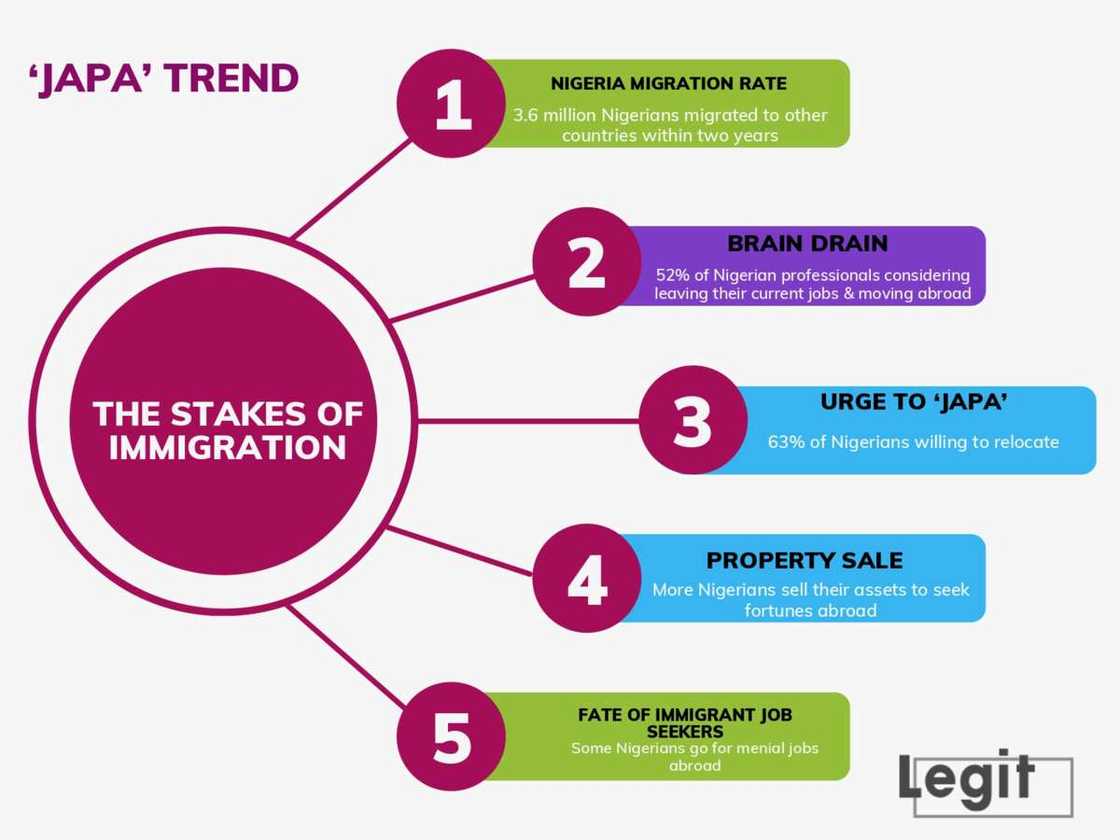Japa Phenomenon: 'Canada is Stressing My Life', How Nigerians Are Embracing Fear and Starting Over
Legit.ng journalist, Ridwan Adeola Yusuf has over 4 years of experience covering migration.
FCT, Abuja - The ‘japa’ wave has refused to subside in Nigeria, and one inference that can be drawn is that a number of citizens of Africa’s most populous nation are opting for a fresh start.
‘Japa’ is a Yoruba word and slang that has gained widespread usage. The term is used to describe the act of Nigerians who are fed up with the system 'fleeing' to seek pastures new abroad.

Source: Facebook
Ayeni Momodu (not real name as he requested anonymity), until 2022, lectured at state-owned Olabisi Onabanjo University (OOU), Ago-Iwoye, Ogun, south-west Nigeria. While the diasporan did not particularly make a fresh start, he joined the ‘japa’ train two years ago.
In the middle-aged man's case, he accompanied his spouse who migrated to the United Kingdom (UK) as a skilled health worker. Like most of the medical practitioners who emigrate for work purposes, Momodu's wife is on a skilled visa. So, for him, he continued on an upward trajectory. Nonetheless, Momodu noted that a good number of Nigerians start over.

Read also
Rudeboy’s ex-wife Anita Okoye’s cryptic post starts debate: “Mistake leftovers for a feast”
“Many, especially if they come for schooling, start even from an unfamiliar ground,” Momodu told Legit.ng via a phone conversation on Saturday, April 13, 2024.
“Then, there are doctors of high-ranking status in Nigeria who would start to get by with factory work or care jobs.”
When it comes to ‘japa’, Nigerians are making tough decisions, resolves people like Kogi-based Gimba Audu said he “cannot understand”.
“Some leave their partner and kids in Nigeria for years. Others sell their properties, things like houses and cars, save millions of naira to ‘japa’ and then start from scratch in another country. I once saw a bank manager, working as a carer. How do you throw a career away to slave for 12-13 pounds an hour?” a perplexed Audu asked rhetorically.
“I legit know a retired officer of the Nigerian Navy who, other things being equal, will relocate abroad by January 2025 to primarily attend university. Many ‘japa’ enthusiasts prefer menial jobs overseas than their high-income Naija (referring to Nigeria) role.”

Read also
Nigerian registered nurse cries out over N40k salary, seeks job vacancy online, netizens offer help

Source: Facebook

Source: Facebook
A video of a Facebook user advertising an uncompleted building for 'japa' sale below:
Toheeb Adetunji, a former Ibadan resident and erstwhile on-air personality (OAP) who relocated to Canada in 2022 for his university education where he expended a huge sum of $50,000 said he fell into depression and contemplated returning home in the first three months.

Source: Facebook
The Higher National Diploma (HND) graduate lived a ‘Pablo life’ (someone who enjoys some VIP privileges) in Nigeria. Earning at least N2 million in a month from Upwork, Fiverr and currency exchange business, he asserted that “Canada is stressing my life”.
“When I got abroad, things changed. One of the challenges I had was the currency and the economy issue. So, if I was a millionaire in Nigeria, I became a 'thousandaire' here.
“I was living fine in Nigeria, not even paying house rent, but one thing that chased me out of the country was insecurity,” a disgruntled Adetunji told Legit.ng.
He “fled” because “anybody — including law enforcement agents — can attack you in Nigeria especially when you are young”.
Adetunji constitutes part of the millions of Nigerians who recently decided to depart the country.
In December 2023, the Nigeria Immigration Service (NIS) disclosed that over 3.6 million citizens migrated to other countries within two years.
According to a survey in the same year by Phillips Consulting, a foremost management consulting firm in Africa, over half (52%) of Nigerian professionals are considering leaving their current jobs and moving abroad within a year.
Additionally, 63 percent of Nigerians disclosed that they will be willing to relocate if an opportunity comes, citing the need for better education (22 percent) and security (12 percent) as the top reasons.
Legit.ng reports that the current troubling economic hardship is also a ground for Nigerian migrants.

Source: Original
Despite accomplishing notable feats in journalism and his seeming upward mobility, Chidiebere Anugwolu chose a sabbatical from sports broadcasting in the winter of 2022, ‘japaing’ to the United States.
Now exploring sports business, for him, ‘japa’ “is starting again and not really starting again”.
“Eventually, what I have come to find out is that your experience still counts,” Anugwolu, popularly called 'Ezenmuo of Sports', pointed out during a chat with Legit.ng.
“For those who start again, I think it is not in the sense of experience in their industry per se, it is starting again to build new connections, cultural differences, and understanding how you can stand out.”
Acknowledging that there are challenges related to international relocation, Anugwolu feels he made the right decision to leave Nigeria and has learnt a lot.
Fresh start depends on migration strategy - Canada-based lady
All her life, Ganiyu Ganiyat has been in arts. A former employee of Price Waters and Coopers (PwC), a prominent professional services firm, youthful Ganiyat is currently training in a health-related course at a public research university in Canada. Her adventure could be classified as ‘beginning again’.

Read also
K1 with teary eyes performs at wedding immediately after burying his mum: “This man is strong”
“Basically, I’m changing fields,” she told Legit.ng from her base in Saskatchewan. “So for someone like me, you can say I’m starting afresh because it is like I’m back to 100-level days.”
Ganiyat explained that starting afresh “has to do with individuals”, and “is largely dependent on the route you came in with”.
“The way someone who came on a study visa would integrate into the corporate environment would be totally different from the way someone who came with a work visa would. I think that is the main factor. Students are limited while those ones (skilled; corporate workers) are not,” she said.
Japa as an upgrade path
US-based Ibrahim Adeyemi said as contrasted with the ‘start over’ notion, he leveraged his education and work experience to achieve personal advancement.
“My migration journey was not about starting over but rather building on existing education and experiences,” said Adeyemi who left Nigeria as an HND holder. “It also opened doors to investment opportunities back home which would have been difficult to attain in Nigeria's challenging socio-economic environment.

Read also
Mr Nigeria Ugo Nwokolo gives reasons for liking women who don’t have money: “Poor girls turn me on”
“Securing visas for the US from the UK allowed me to explore more opportunities for personal and academic growth.”

Source: Original
In the same vein, Yusuf Onayemi, also a Nigerian national resident in the US, said he “upgraded" the life he lived in Africa.
He shared:
“I had a bachelor's degree before coming to the US for my master's and it was on scholarship. Things can be rough at first for many immigrants, but for me, I built on the knowledge and experience I had in Nigeria before leaving for the States.
"I upgraded from BSc to Masters and also I am working as a site reliability engineer which is an upgrade of my network engineer role in Nigeria.”
Corroborating this, a Nigerian student at the Islamic University of Madinah, Saudi Arabia, who prefers not to be named, postulated that “there is nothing to fear” about starting over because “the foundation of education back home is there”.

Read also
Portable, Queen Dami follow each other back on Instagram weeks after messy breakup: “It’s true love”
'Japa' advice
Adetunji, the aggrieved Canada-based Nigerian student, said for Africans struggling to make ends meet, he would encourage them to ‘japa’ because “abroad is for this kind of people”.
He also urged those emigrating as students to "have enough money".
“If you can make N1 million, N1.5 million, N2 million monthly and above in Nigeria and you are paying your bills, I don't think there is anything you are coming to do abroad. Though this might sound ridiculous to some people, trust me, I have seen enough,” he reasoned.
“I’m addressing those promised conversion of their visitor's visa to work permit.”
From his point of view, Nigerians who sold off all their physical assets to exit the country did not make the wisest of decisions.
He said:
"Instead of taking the risk of selling off one’s house or land, I think they can keep it because it is expensive and will continue to rise in value. Look for other means to raise the money you need.”
On changing status from visitor visa to green card, Adetunji explained that the chances are extremely slim if migrants do not follow the right route, cautioning against transacting with devious travel agents.
“I always advise people that ‘don’t do visiting (visa) to any country if you know you won’t go back’,” he stressed. “When they tell you you can come for a conference, they would help you change it to a work permit, it’s all lies. Don’t let anybody fool you, it is ninety percent impossible.
“These agents do visiting visas for them which is so hard to switch to a work permit. They don’t have status, they can’t work; you see them stranded.
“If you sell your land or house and say you are leaving Nigeria through a visiting visa, for example, the conference one popular Ibadan broadcaster is advertising on air, it is ludicrous.”
Chinomso Eyegheleme, a young Nigerian based in New York City, USA, is the founder of ConnectExpat, an online community that helps international students share information and network with others.

Read also
Rita Edochie complains about reactions to men who cheat compared to women: “Life no balance”
Nomso (for short) stated that “it is hard starting again in another place”, thus he asked prospective migrants to ‘japa’ legally and through the appropriate channel.

Source: Original
He told Legit.ng:
“Indeed, ‘japa’ can be depressing if you don't secure the right occupation or fail to do your research properly before leaving Nigeria. There are differences too: different cultures, laws, and sometimes language. If you add immigration issues, it would be very hard."
Notwithstanding, Nomso believes the ‘japa’ syndrome "is necessary" considering the world is becoming globalised and sometimes, different environment stimulates peculiar opportunities and talent.
He said:
“I’d advise people to japa correctly. It is not always easy at the start of the tunnel but there is light at the end!”
‘Europeans 'japaing’ to Africa’, lecturer speaks
Earlier, Legit.ng reported that Dr Isa Olalekan Elegbede, a lecturer at the Department of Fisheries, Lagos State University (LASU), said while a lot of Africans are migrating overseas, “Europeans are coming in hordes to Africa”.

Read also
Gospel Singer Oluwatimileyin Ajayi arrested by police for brutally killing his girlfriend in Abuja
Elegbede urged Nigerians to “begin to have conversations around the economic opportunities in Africa”.
PAY ATTENTION: Сheck out news that is picked exactly for YOU ➡️ find the “Recommended for you” block on the home page and enjoy!
Source: Legit.ng





